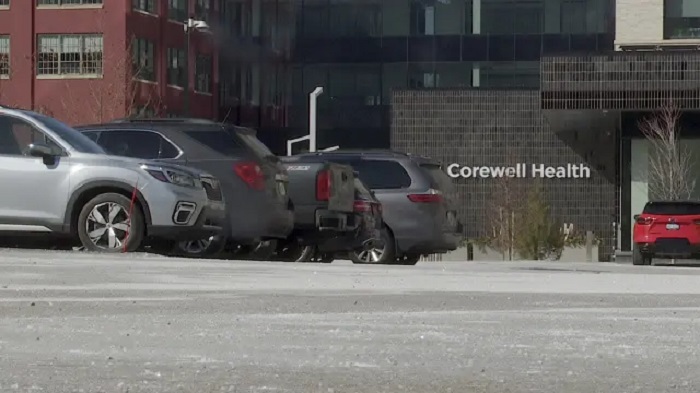Grand Rapids, Mich. — Corewell Health’s plans for the Monroe North neighborhood faced a setback Thursday when the Grand Rapids City Planning Commission decided to table the approval of a new surface parking lot. The health care provider had hoped to kick off a parking shuffle near its Corewell Health Place campus, but commissioners expressed reservations about the proposal’s timing and necessity.
Corewell Health is aiming to redevelop its campus, which includes the construction of a new residential tower on Ottawa Avenue. However, the planned tower, which would replace some of the existing surface parking, is still in the early design phase. As a result, the health system is seeking approval for a temporary solution—a new 39-space parking lot on a site across the street from the proposed tower, in order to offset the parking loss once construction begins.
Rodney VanderZand, Corewell Health’s director of planning and design, outlined the proposal, noting that the residential tower’s design is still in progress. He acknowledged that while the parking lot is necessary to address immediate needs, the residential project itself could take a few years before it moves forward.
“We do spill over into the site, into the 166 spaces where the residential housing project is going to go,” VanderZand explained. “I can’t speak to the frequency. We just as of first week of January had our parking control installed.”
Despite this, the planning commission was not immediately convinced of the proposal’s urgency. Several members voiced concerns about the timing, questioning whether the parking lot was essential before the residential tower was fully realized.
“If it was going to be allowed, I’m not sure why it would be allowed before the residential housing existed,” said commission member Brian Swem.
Another commissioner, Lawrence Williams, expressed his uncertainty regarding the proposal and the broader context of urban planning in the area. “We’re not sure if we need it. We’re not sure if there is a different mode of transportation plan. We’re not sure of much,” Williams remarked.
Community feedback revealed strong support for other aspects of the neighborhood, including its walkability, public parks, and access to the river. Some residents encouraged the commission to focus on community-building initiatives rather than additional parking infrastructure. One commenter noted the area’s potential for placemaking, citing that many spaces currently used for parking could be repurposed for more engaging uses.
“I realized that all these things are in locations that were parking lots. I invite our commission to maybe skip the parking lot phase and go to the community building and placemaking things,” the commenter said.
Further voices echoed concerns over prioritizing parking in an area that the city’s development plans—such as the Monroe North and GR Forward initiatives—identify as a location for pedestrian-friendly spaces and improved public transportation access. One resident pointed out the inconsistency between the proposed parking lot and the city’s emphasis on mobility strategies and riverfront accessibility.
“The Monroe North plan specifies a pedestrian priority. The GR Forward plan prioritizes access to the river… It also encouraged a 21st-century mobility strategy, the use of public transportation. And I look at this map showing what is dedicated to parking—not mixed use, parking—and ask, ‘Is that what we are building?’” the commenter asked.
The Planning Commission’s decision to table the approval for now reflects a broader debate about the future of the Monroe North neighborhood, balancing the growth of a major health institution with the city’s vision for a more sustainable, walkable urban environment. As Corewell Health moves forward with its development plans, the Commission’s decision suggests that further discussions will be needed to ensure that future growth aligns with both community needs and the city’s long-term development goals.







